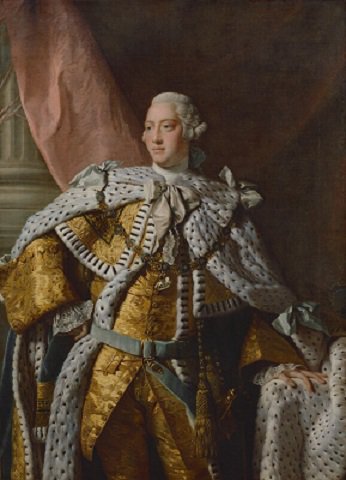King of England (reigned 1760-1820).[1] George III succeeded to the throne on the death of his grandfather, George II, in 1760; he was the first Hanoverian monarch to have been born in England and the first whose native language was English. His political difficulties aside – including the loss of the American colonies and opposition to his policies from the Whigs – George III took an active interest in culture and contemporaneous science and technology, establishing the Royal Collection of books (later given to the British Museum), helping, in 1768, to found and finance the Royal Academy of Arts, and collecting scientific instruments.

Studio of Allan Ramsay, George III, based on a work of 1761-1762
[1] Leopold refers to him as 'King of England', while in fact he was actually 'King of the United Kingdom of Great Britain and Ireland' from 1801, with a variation of this title before 1801. This means he was King of England, King of Scotland, and King of Ireland, as well as King of the United Kingdom.
- Mozart Relevance
-
Shortly after their arrival in London on 23 April 1764, Mozart and his sister performed for George III and Queen Charlotte. Leopold Mozart wrote to his Salzburg landlord, Johann Lorenz Hagenauer, on 28 May:
- On April 27th we were with the King and Queen in the Queen’s Palace in St. James’s Park. . . the graciousness with which both His Majesty the King and Her Majesty the Queen received us cannot be described. In short, their easy manner and friendly ways made us forget that they were the King and Queen of England. At all courts up to now we have been received with extraordinary courtesy. But the welcome which we have been given here exceeds all others. A week later we were walking in St. James’s Park. The King came along driving with the Queen and, although we all had on different clothes, they recognized us nevertheless and not only greeted us, but the King opened the window, leaned out and saluted us and especially our Master Wolfgang, nodding to us and waving his hand. . . on May 19th we were again with the King and Queen from six to ten in the evening, when the only other people present were the two princes, who are the King’s brothers, and another, the brother of the Queen. . . The King placed before him not only works of Wagenseil, but those of Bach, Abel and Handel, and he played off everything prima vista. He played so splendidly on the King’s organ that they all value his organ playing more highly than his keyboard playing. Then he accompanied the Queen in an aria which she sang, and also a flautist who played a solo. Finally he took the bass part of some airs of Handel (which happened to be lying there) and played the most beautiful melody on it and in such a manner that everyone was amazed.
- On April 27th we were with the King and Queen in the Queen’s Palace in St. James’s Park. . . the graciousness with which both His Majesty the King and Her Majesty the Queen received us cannot be described. In short, their easy manner and friendly ways made us forget that they were the King and Queen of England. At all courts up to now we have been received with extraordinary courtesy. But the welcome which we have been given here exceeds all others. A week later we were walking in St. James’s Park. The King came along driving with the Queen and, although we all had on different clothes, they recognized us nevertheless and not only greeted us, but the King opened the window, leaned out and saluted us and especially our Master Wolfgang, nodding to us and waving his hand. . . on May 19th we were again with the King and Queen from six to ten in the evening, when the only other people present were the two princes, who are the King’s brothers, and another, the brother of the Queen. . . The King placed before him not only works of Wagenseil, but those of Bach, Abel and Handel, and he played off everything prima vista. He played so splendidly on the King’s organ that they all value his organ playing more highly than his keyboard playing. Then he accompanied the Queen in an aria which she sang, and also a flautist who played a solo. Finally he took the bass part of some airs of Handel (which happened to be lying there) and played the most beautiful melody on it and in such a manner that everyone was amazed.
- Date 1
- 1738, London
- Date 2
- 1820, Windsor
- Date (Mozart)
- 1764 April-May
- Location (Mozart)
- London
- Bibliographic Reference
- Watson, 1960